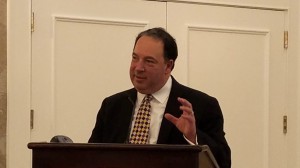
AAM President Mitch Bainwol is hoping the results of the recently re-instituted midterm review fuel-economy standards will bring consensus.
The auto industry isn’t looking for a war with the State of California, says Mitch Bainwol, president of the Alliance of Automobile Manufacturers.
However, the alliance does want to see a dispassionate review of federal fuel-economy standards, Bainwol said during an appearance at the NADA-J.D. Power Automotive Forum in New York City this week, which is why it supported the Trump administration’s decision to review the federal standards imposed earlier this year by the U.S. Environmental Protection Agency by former President Barack Obama.
The 2022-2025 standards were imposed without the technical study or midterm review, which would determine whether the standards could be met technically and at a reasonable cost, Bainwol said. The Trump administration’s action basically re-instates the midterm review, which should offer a clear view of whether the standards could drive up the cost of new vehicles, he said.
Consumers have long been reluctant to pay extra for the kind of technology required to meet tougher standards, he said.
(CARB, EPA on track for emissions showdown. Click Here for the story.)
Bainwol, however, the industry wants the State of California, which has a very different view of fuel economy and greenhouse gas emissions than the Trump administration, to be part of any agreement on auto pollution. Under the current rules, California has the right to set its own standards, but the industry is hoping to have a single standard in place in the future, he said.
“California has to be part of the solution,” Jim Lentz, chief executive officer of Toyota Motor America recently told TheDetroitBureau.com.
During a discussion with reporters after his appearance at the forum, Bainwol acknowledged that the California and the Trump administration are nowhere near agreement. “That’s why we have discussions,” he said, adding he hoped the midterm review will produce the kind of hard data that can bring both sides to consensus.
(Trump announces CAFE rule review will be reopened. Click Here for the story.)
Bainwol stressed that the Alliance is not looking for a confrontation with the State of California on greenhouse gas emissions, which experts believe have helped speed up the rate of climate change on earth.
But California’s policy makers believe in the reality of climate change, he also acknowledged. But the Trump administration has filled key policy-making positions with executives that basically deny that climate change is being accelerated by man-made emissions. The differences could ultimately wind up in court, some experts have predicted.
In fact, some of his advisers are now expressing disappointment that President Trump hasn’t done more to deny the existence of climate change. Car makers and their executives have been reluctant to go that far, in part, because of the influence of environmentalists, particularly on younger consumers, who are potential car buyers.
(For more on the EPA’s mileage decision, Click Here.)
Bainwol also noted one of the reasons the auto industry would prefer to avoid a direct confrontation with the State of California is that the Golden State is a strikingly different market than the rest of the country. Electric vehicles and hybrids are much more popular in California than they are in other parts of the country, which have moved towards trucks and sport utility vehicles.
